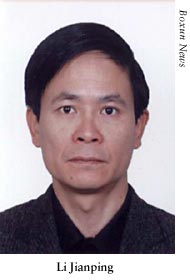New York, July 26, 2005 – The Committee to Protect Journalists condemns the imprisonment of Internet journalist Li Jianping on suspicion of defamation.
Authorities detained Li on May 27 in Zibo, a city in northeastern China’s Shandong Province, and formally arrested him for defamation on June 30, according to ChinaEForum, a U.S.-based dissident news forum. Charges have not yet been filed.
Local police had summoned the journalist to the police station days before detaining him, Li’s wife told the editors of ChinaEForum. She also said that government-employed Internet-control personnel had searched his computer.
Li, 39, wrote frequently for overseas news Web sites banned in China, such as Boxun News, Epoch Times, China Democracy and ChinaEWeekly. Some of his articles directly criticized Chinese Communist Party leadership, including former and current Chinese presidents Jiang Zemin and Hu Jintao. Just days before his detention, Li wrote a strongly critical analysis of Hu Jintao’s policy toward Taiwan, posted on ChinaEWeekly on May 17. It remains unclear which of his articles led to his detention.
“As China establishes itself as a major world power, its government must allow its people to have a voice in the nation’s affairs,” CPJ Executive Director Ann Cooper said. “Li Jianping has been unjustly imprisoned for his journalistic work. We call for his immediate and unconditional release.”
Libel suits, mostly civil, are an increasingly common way to penalize Chinese writers and media organizations for criticizing business leaders or political figures. Criminal libel resulting in jail time is relatively rare. But in December 2004, freelance writer Zhang Ruquan was sentenced to three years in prison for defamation that “seriously undermined social order or the state interest” after writing an essay that criticized Jiang Zemin.
Roughly half of the 42 journalists imprisoned in China at the end of 2004 had been jailed for work distributed online, according to CPJ research. China’s government employs tens of thousands of Internet-control personnel to police online content.
![]()
